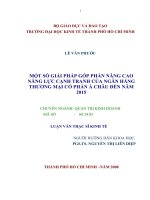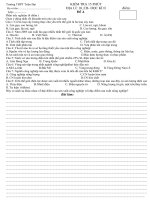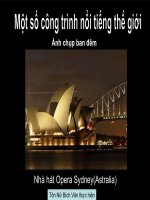A 516 a 516m 10 (2015)
Bạn đang xem bản rút gọn của tài liệu. Xem và tải ngay bản đầy đủ của tài liệu tại đây (70.56 KB, 4 trang )
Designation: A516/A516M − 10 (Reapproved 2015)
Used in USDOE-NE Standards
Standard Specification for
Pressure Vessel Plates, Carbon Steel, for Moderate- and
Lower-Temperature Service1
This standard is issued under the fixed designation A516/A516M; the number immediately following the designation indicates the year
of original adoption or, in the case of revision, the year of last revision. A number in parentheses indicates the year of last reapproval.
A superscript epsilon (´) indicates an editorial change since the last revision or reapproval.
This standard has been approved for use by agencies of the U.S. Department of Defense.
2. Referenced Documents
1. Scope
2
2.1 ASTM Standards:3
A20/A20M Specification for General Requirements for Steel
Plates for Pressure Vessels
A435/A435M Specification for Straight-Beam Ultrasonic
Examination of Steel Plates
A577/A577M Specification for Ultrasonic Angle-Beam Examination of Steel Plates
A578/A578M Specification for Straight-Beam Ultrasonic
Examination of Rolled Steel Plates for Special Applications
1.1 This specification covers carbon steel plates intended
primarily for service in welded pressure vessels where improved notch toughness is important.
1.2 Plates under this specification are available in four
grades having different strength levels as follows:
Grade U.S. [SI]
55
60
65
70
[380]
[415]
[450]
[485]
Tensile Strength,
ksi [MPa]
55–75 [380–515]
60–80 [415–550]
65–85 [450–585]
70–90 [485–620]
1.3 The maximum thickness of plates is limited only by the
capacity of the composition to meet the specified mechanical
property requirements; however, current practice normally
limits the maximum thickness of plates furnished under this
specification as follows:
Grade U.S. [SI]
55
60
65
70
[380]
[415]
[450]
[485]
3. General Requirements and Ordering Information
3.1 Material supplied to this product specification shall
conform to Specification A20/A20M, which outlines the testing and retesting methods and procedures, permissible variations in dimensions and mass, quality and repair of defects,
marking, loading, and ordering information.
Maximum Thickness,
in. [mm]
12 [305]
8 [205]
8 [205]
8 [205]
3.2 In addition to the basic requirements of this
specification, certain supplementary requirements are available
where additional control, testing, or examination is required to
meet end use requirements. The purchaser is referred to the
listed supplementary requirements in this specification and to
the detailed requirements in Specification A20/A20M.
1.4 For plates produced from coil and furnished without
heat treatment or with stress relieving only, the additional
requirements, including additional testing requirements and the
reporting of additional test results of Specification A20/A20M
apply.
3.3 If the requirements of this specification are in conflict
with the requirements of Specification A20/A20M, the requirements of this specification shall prevail.
1.5 The values stated in either inch-pound units or SI units
are to be regarded separately as standard. Within the text, the
SI units are shown in brackets. The values stated in each
system are not exact equivalents; therefore, each system must
be used independently of the other. Combining values from the
two systems may result in nonconformance with the specification.
3.4 Coils are excluded from qualification to this specification until they are processed into finished plates. Plates
produced from coil means plates that have been cut to
individual lengths from coil. The processor directly controls, or
is responsible for, the operations involved in the processing of
coils into finished plates. Such operations include decoiling,
leveling, cutting to length, testing, inspection, conditioning,
heat treatment (if applicable), packaging, marking, loading for
shipment, and certification.
1
This specification is under the jurisdiction of ASTM Committee A01 on Steel,
Stainless Steel and Related Alloys and is the direct responsibility of Subcommittee
A01.11 on Steel Plates for Boilers and Pressure Vessels.
Current edition approved Sept. 1, 2015. Published September 2015. Originally
approved in 1964. Last previous edition approved in 2010 as A516/A516M – 10.
DOI: 10.1520/A0516_A0516M-10R15.
2
For ASME Boiler and Pressure Vessel Code applications, see related Specification SA-516/SA-516M in Section II of that Code.
3
For referenced ASTM standards, visit the ASTM website, www.astm.org, or
contact ASTM Customer Service at For Annual Book of ASTM
Standards volume information, refer to the standard’s Document Summary page on
the ASTM website.
Copyright © ASTM International, 100 Barr Harbor Drive, PO Box C700, West Conshohocken, PA 19428-2959. United States
1
A516/A516M − 10 (2015)
5.4 If approved by the purchaser, cooling rates faster than
those obtained by cooling in air are permissible for improvement of the toughness, provided the plates are subsequently
tempered in the temperature range 1100 to 1300°F [595 to
705°C].
NOTE 1—For plates produced from coil and furnished without heat
treatment or with stress relieving only, three test results are reported for
each qualifying coil. Additional requirements regarding plate produced
from coil are described in Specification A20/A20M.
3.5 If the requirements of this specification are in conflict
with the requirements of Specification A20/A20M, the requirements of this specification shall prevail.
6. Chemical Composition
4. Materials and Manufacture
6.1 The steel shall conform to the chemical requirements
given in Table 1 unless otherwise modified in accordance with
Supplementary Requirement S17, Vacuum Carbon-Deoxidized
Steel, in Specification A20/A20M.
4.1 Steelmaking Practice—The steel shall be killed and
shall conform to the fine austenitic grain size requirement of
Specification A20/A20M.
5. Heat Treatment
7. Mechanical Properties
5.1 Plates 1.50 in. [40 mm] and under in thickness are
normally supplied in the as-rolled condition. The plates may be
ordered normalized or stress relieved, or both.
7.1 Tension Test—The plates, as represented by the tension
test specimens, shall conform to the requirements given in
Table 2.
5.2 Plates over 1.50 in. [40 mm] in thickness shall be
normalized.
8. Keywords
5.3 When notch-toughness tests are required on plates
1 ⁄ in. [40 mm] and under in thickness, the plates shall be
normalized unless otherwise specified by the purchaser.
8.1 carbon steel; carbon steel plate; pressure containing
parts; pressure vessel steels; steel plates for pressure vessels
12
TABLE 1 Chemical Requirements
Composition, %
Elements
Carbon, max:A,B
1⁄2 in. [12.5 mm] and under
Over 1⁄2 in. to 2 in. [12.5 to 50 mm], incl
Over 2 in. to 4 in. [50 to 100 mm], incl
Over 4 to 8 in. [100 to 200 mm], incl
Over 8 in. [200 mm]
Manganese:B
1⁄2 in. [12.5 mm] and under:
Heat analysis
Product analysis
Over 1⁄2 in. [12.5 mm]:
Heat analysis
Product analysis
Phosphorus, maxA
Sulfur, maxA
Silicon:
Heat analysis
Product analysis
Grade 55
[Grade 380]
Grade 60
[Grade 415]
Grade 65
[Grade 450]
Grade 70
[Grade 485]
0.18
0.20
0.22
0.24
0.26
0.21
0.23
0.25
0.27
0.27
0.24
0.26
0.28
0.29
0.29
0.27
0.28
0.30
0.31
0.31
0.60–0.90
0.55–0.98
0.60–0.90C
0.55–0.98C
0.85–1.20
0.79–1.30
0.85–1.20
0.79–1.30
0.60–1.20
0.55–1.30
0.025
0.025
0.85–1.20
0.79–1.30
0.025
0.025
0.85–1.20
0.79–1.30
0.025
0.025
0.85–1.20
0.79–1.30
0.025
0.025
0.15–0.40
0.13–0.45
0.15–0.40
0.13–0.45
0.15–0.40
0.13–0.45
0.15–0.40
0.13–0.45
A
Applies to both heat and product analyses.
For each reduction of 0.01 percentage point below the specified maximum for carbon, an increase of 0.06 percentage point above the specified maximum for manganese
is permitted, up to a maximum of 1.50 % by heat analysis and 1.60 % by product analysis.
C
Grade 60 plates 1⁄2 in. [12.5 mm] and under in thickness may have 0.85–1.20 % manganese on heat analysis, and 0.79–1.30 % manganese on product analysis.
B
2
A516/A516M − 10 (2015)
TABLE 2 Tensile Requirements
Grade
55 [380]
Tensile strength, ksi [MPa]
Yield strength, min,A ksi [MPa]
Elongation in 8 in. [200 mm], min, %B
Elongation in 2 in. [50 mm], min, %B
A
B
60 [415]
55–75 [380–515]
30 [205]
23
27
60–80 [415–550]
32 [220]
21
25
65 [450]
70 [485]
65–85 [450–585]
35 [240]
19
23
70–90 [485–620]
38 [260]
17
21
Determined by either the 0.2 % offset method or the 0.5 % extension-under-load method.
See Specification A20/A20M for elongation adjustment.
SUPPLEMENTARY REQUIREMENTS
Supplementary requirements shall not apply unless specified in the purchase order.
A list of standardized supplementary requirements for use at the option of the purchaser is included
in ASTM Specification A20/A20M. Those that are considered suitable for use with this specification
are listed below by title.
S1. Vacuum Treatment,
S2. Product Analysis,
S3. Simulated Post-Weld Heat Treatment of Mechanical
Test Coupons,
S4.1 Additional Tension Test,
S5. Charpy V-Notch Impact Test,
S6. Drop Weight Test (for Material 0.625 in. [16 mm] and
over in Thickness),
S7. High-Temperature Tension Test,
S8. Ultrasonic Examination in accordance with Specification A435/A435M,
S9. Magnetic Particle Examination,
S11. Ultrasonic Examination in accordance with Specification A577/A577M,
S12. Ultrasonic Examination in accordance with Specification A578/A578M, and
S17. Vacuum Carbon-Deoxidized Steel.
ADDITIONAL SUPPLEMENTARY REQUIREMENTS
In addition, the following supplementary requirement is suitable for this application.
Maximum vanadium plus niobium = 0.03 %
(Note: niobium = columbium)
S54.5 The maximum composition based on heat analysis of
Ni + Cu shall be 0.15 %.
S54.6 The minimum C content based on heat analysis shall
be 0.18 %. The maximum C content shall be as specified for
the ordered grade.
S54.7 Welding consumables for repair welds shall be of the
low-hydrogen type. E60XX electrodes shall not be used and
the resulting weld chemistry shall meet the same chemistry
requirements as the base metal.
S54.8 In addition to the requirements for product marking in
the specification, an “HF-N” stamp or marking shall be
provided on each plate to identify that the plate complies with
this supplementary requirement.
S54. Requirements for Carbon Steel Plate for Hydrofluoric
Acid Alkylation Service
S54.1 Plates shall be provided in the normalized heattreated condition.
S54.2 The maximum carbon equivalent shall be as follows:
Plate thickness less than or equal to 1 in. [25 mm]: CE
maximum = 0.43
Plate thickness greater than 1 in. [25 mm]: CE maximum
= 0.45
S54.3 Determine the carbon equivalent (CE) as follows:
CE 5 C1Mn/61 ~ Cr1Mo1V ! /51 ~ Ni1Cu! /15
S54.4 Vanadium and niobium maximum content based on
heat analysis shall be:
Maximum vanadium = 0.02 %
Maximum niobium = 0.02 %
3
A516/A516M − 10 (2015)
ASTM International takes no position respecting the validity of any patent rights asserted in connection with any item mentioned
in this standard. Users of this standard are expressly advised that determination of the validity of any such patent rights, and the risk
of infringement of such rights, are entirely their own responsibility.
This standard is subject to revision at any time by the responsible technical committee and must be reviewed every five years and
if not revised, either reapproved or withdrawn. Your comments are invited either for revision of this standard or for additional standards
and should be addressed to ASTM International Headquarters. Your comments will receive careful consideration at a meeting of the
responsible technical committee, which you may attend. If you feel that your comments have not received a fair hearing you should
make your views known to the ASTM Committee on Standards, at the address shown below.
This standard is copyrighted by ASTM International, 100 Barr Harbor Drive, PO Box C700, West Conshohocken, PA 19428-2959,
United States. Individual reprints (single or multiple copies) of this standard may be obtained by contacting ASTM at the above
address or at 610-832-9585 (phone), 610-832-9555 (fax), or (e-mail); or through the ASTM website
(www.astm.org). Permission rights to photocopy the standard may also be secured from the Copyright Clearance Center, 222
Rosewood Drive, Danvers, MA 01923, Tel: (978) 646-2600; />
4









